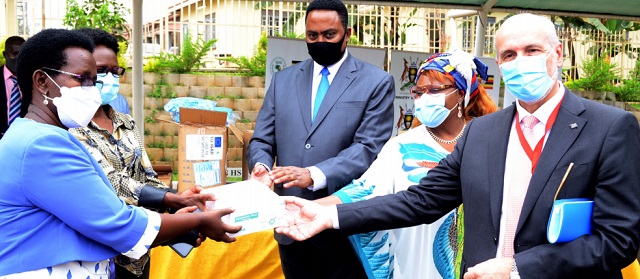
IGAD boss says international community should unite against ‘vaccine nationalism’
Kampala, Uganda | RONALD MUSOKE | As African governments struggle to secure the sought after COVID-19 vaccine, Dr. Workneh Gebeyehu, the Executive Secretary of the Intergovernmental Authority on Development (IGAD) has said access to the vaccine should be taken as a human rights issue.
“Without the vaccine, the lives and livelihood opportunities of millions of people in Africa will be severely affected,” Gebeyehu said, “Our strategy is to work closely with member states to develop the capacity to distribute and administer the COVID-19 vaccine.”
Gebeyehu was speaking in Kampala on Feb. 24 as IGAD in collaboration with the European Union (EU) and the United Nations Office for Project Services (UNOPS) handed over essential supplies worth €1.87 million (about Shs8 billion) to Dr. Jane Ruth Aceng, Uganda’s Minister of Health.
The supplies include two advanced ambulances and personal protective equipment (500,000 surgical masks, 100,000 surgical caps and 100,000 N95 masks). These are to be distributed in Malaba, Busia, Elegu points of entry and exit as well as Adjumani refugee camp.
Gebeyehu noted that in preparation for the vaccine phase of the Coronavirus response, IGAD has formulated a regional COVID-19 vaccine strategy that has two main objectives; one, promoting early and sufficient access to safe and effective COVID vaccines, and two, eliminating existing barriers to the efficient procurement, delivery, distribution and uptake of the COVID-19 vaccine in the IGAD bloc.
The IGAD region comprises eight African states including; Djibouti, Eritrea, Ethiopia, Kenya, Somalia, South Sudan, Sudan and Uganda. The bloc stretches over an area of 5.2 million square kilometres and has a combined population of over 230 million people, 50% of whom are youth.
With a regional Gross Domestic Product (GDP) of over US$200bn and a population expected to reach 400 million by 2050, the IGAD region is a sizeable market which provides a good opportunity for economic growth especially if the youth are provided with appropriate access to learning as well as incentives to sustain their emerging enterprises and organisations.
Flanked by Lucy Daxbacher, the IGAD head of mission to Uganda and Attilio Pacifici, the head of the EU Delegation in Uganda, Gebeyehu noted that in the next few months, all indications are that the ability to travel, to work and to do business internationally will depend on one’s vaccination status.
According to the Africa Centres for Disease Control dashboard accessed on Feb.26, Africa has so far registered up to 3,856,581 cumulative cases of COVID-19 infections and 102,470 deaths while 3,421,526 recoveries have been registered.
Within the IGAD bloc, there have been 354, 627 cumulative cases of COVID-19 and 6,760 deaths according to the Johns Hopkins University COVID-19 Dashboard accessed on Feb.26 by The Independent.
On Feb.17, the World Health Organisation (WHO) regional office told African health ministers that a rapid vaccine rollout is expected in the wake of the WHO listing of two versions of the AstraZeneca-Oxford COVID-19 vaccine for emergency use.
Dr Matshidiso Moeti, the WHO Regional Director for Africa told the ministers that national deployment and vaccination plans for COVID-19 vaccines from 35 low-income African countries eligible for free vaccines from the COVAX Facility have been accepted by an independent regional review committee.
“Africa is revving up to rollout COVID-19 vaccines. These thorough vaccine preparation plans will help ensure African countries can hit the ground running in quickly immunizing the most vulnerable people. Meticulous planning is key to ensuring vaccines reach all priority groups, wherever they are, in every single African country,” she said.
Under the COVAX Facility, an international coalition set up to give equal access to the vaccine to all countries, African governments were promised equitable accessibility to the much needed vaccines but wealthier nations have in the past been accused of hoarding vaccines and leaving African governments behind in the race to inoculate their citizens.
But only Ghana has so far received the COVID-19 vaccines through the World Health Organization’s COVAX programme. On Feb. 24, Ghana became the first country on the continent to receive 600,000 doses of the AstraZeneca vaccines produced by the Serum Institute of India.
 The Independent Uganda: You get the Truth we Pay the Price
The Independent Uganda: You get the Truth we Pay the Price


